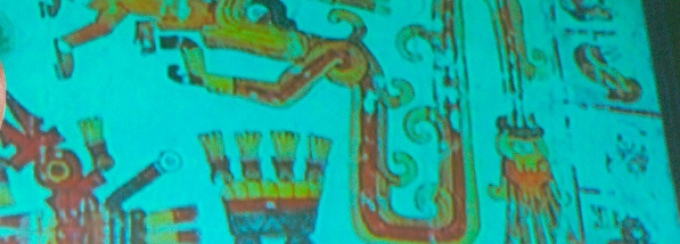Historical Linguistics

Mayan hieroglyphics projected on a screen during a talk at UB
Historical linguistics is the study of how languages change, and how they are related to one another. When a family of languages has been studied in sufficient detail, it is possible to know how most words, sounds, and grammar rules have changed in those languages across large spans of time. Several members and affiliated members of the Department of Linguistics are actively engaged in research on language change and comparative reconstruction.
Core Researchers
David Fertig, PhD specializes in historical Germanic linguistics, focusing especially on morphological change and grammaticalization. Along with a sociohistorical perspective that informs much of his research, he looks for insights from recent psycholinguistic work that can help us understand the cognitive mechanisms behind language change.
Jeff Good, PhD's research focuses on diachronic typology and the way historical change shapes synchronic grammars. He has done comparative-historical work on Benue-Congo languages, with a particular focus on Bantoid languages, as well as on the historical development of Saramaccan creole.
Karin Michelson, PhD has a long-standing interest in comparative Northern Iroquoian and especially in the nature of the accent system towards an understanding of the systems in terms of the distinction between stress and tone. She also is looking at fast-speech and prosodic phenomena in Oneida, and the extent to which some of these have become phonologized in Oneida and other Iroquoian languages.
Wolfgang Wölck, PhD is engaged in continuing work on the development of new linguistic varieties from language contact and bilingualism, in particular American urban dialects (‘ethnolects’) resulting from contact between immigrant languages and English. One current project explains the famous ‘Northern Cities Shift’ as a contact linguistic rather than a monogenetic English-internal phenomenon.
Roger Woodard, PhD of the Department of Classics specializes in Indo-European culture and linguistics. He is at present continuing his research on the origin and evolution of Mediterranean writing systems with an analysis of a set of copper plaques inscribed with an unusual form of the Greek alphabet — possibly the earliest example of Greek alphabetic writing thus far discovered. He is also at work on Ancient Greek: A Linguistic Introduction, a volume in a new series by Cambridge University Press.